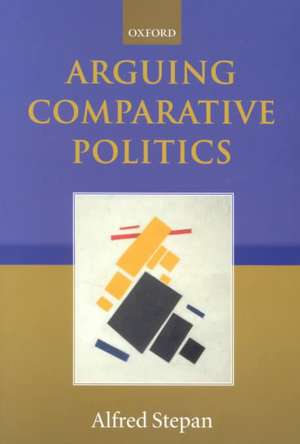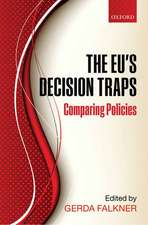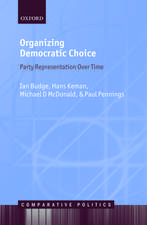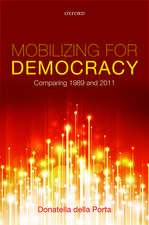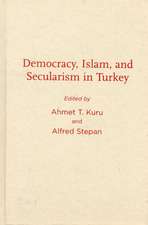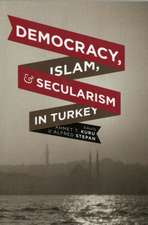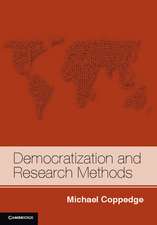Arguing Comparative Politics
Autor Alfred Stepanen Limba Engleză Paperback – 14 iun 2001
| Toate formatele și edițiile | Preț | Express |
|---|---|---|
| Paperback (1) | 528.90 lei 31-38 zile | |
| OUP OXFORD – 14 iun 2001 | 528.90 lei 31-38 zile | |
| Hardback (1) | 864.34 lei 31-38 zile | |
| OUP OXFORD – 14 iun 2001 | 864.34 lei 31-38 zile |
Preț: 528.90 lei
Preț vechi: 674.28 lei
-22% Nou
Puncte Express: 793
Preț estimativ în valută:
101.20€ • 105.66$ • 83.76£
101.20€ • 105.66$ • 83.76£
Carte tipărită la comandă
Livrare economică 24-31 martie
Preluare comenzi: 021 569.72.76
Specificații
ISBN-13: 9780198299974
ISBN-10: 0198299974
Pagini: 384
Ilustrații: tables
Dimensiuni: 157 x 236 x 20 mm
Greutate: 0.56 kg
Editura: OUP OXFORD
Colecția OUP Oxford
Locul publicării:Oxford, United Kingdom
ISBN-10: 0198299974
Pagini: 384
Ilustrații: tables
Dimensiuni: 157 x 236 x 20 mm
Greutate: 0.56 kg
Editura: OUP OXFORD
Colecția OUP Oxford
Locul publicării:Oxford, United Kingdom
Recenzii
It is quite useful to find so much interesting material concentrated in a single volume. There are, however, two substantive issues on which Stephan breaks new ground and which promise substantial future edifices: 1) the impact of world religious systems upon democracy; and 2) the prospects for federalism as a solution to political order in multinational democracies.
One is constantly reminded when reading these chapters of how much richer comparative work can be when it is not just an abstract method of research but also possesses a component of human interaction built into the very processes of conceptualizing a problem and writing up the final results.
There is something for almost everyone who enjoys arguing about politics and wonders why human beings have invented so many ways of practising and justifying this activity.
The book is impressive in its empirical range. In what is a convincing argument for comparative politics, it covers virtually all corners of the world, from the established liberal democracies in the West to democratizing or consolidating democracies in Latin America and eastern Europe. In addition, Stepan's essays stand out for the bridges they construct between the empirical and theoretical debates. Whether focusing on political identities or institutions, or on the power of the state versus society, Stepan reveals an extraordinary capacity for selecting the problems relevant to contemporary democracies and arriving at agenda-setting findings ... an invaluable collection of essays.
A striking demonstration of Alfred Stepan's remarkable combination of analytic range and his career-long commitment to extracting novel insights through interviews with key actors. Big questions, fruitful comparisons, and agenda-setting findings.
One is constantly reminded when reading these chapters of how much richer comparative work can be when it is not just an abstract method of research but also possesses a component of human interaction built into the very processes of conceptualizing a problem and writing up the final results.
There is something for almost everyone who enjoys arguing about politics and wonders why human beings have invented so many ways of practising and justifying this activity.
The book is impressive in its empirical range. In what is a convincing argument for comparative politics, it covers virtually all corners of the world, from the established liberal democracies in the West to democratizing or consolidating democracies in Latin America and eastern Europe. In addition, Stepan's essays stand out for the bridges they construct between the empirical and theoretical debates. Whether focusing on political identities or institutions, or on the power of the state versus society, Stepan reveals an extraordinary capacity for selecting the problems relevant to contemporary democracies and arriving at agenda-setting findings ... an invaluable collection of essays.
A striking demonstration of Alfred Stepan's remarkable combination of analytic range and his career-long commitment to extracting novel insights through interviews with key actors. Big questions, fruitful comparisons, and agenda-setting findings.
Notă biografică
Alfred Stepan is Wallace S. Sayre Professor of Government at Columbia University. In his career he has also been Gladstone Professor of Government at Oxford University, the first Rector of Central European University, and the Director of Graduate Studies in Political Science at Yale University. He is a Fellow of the American Academy of Arts and Sciences and of the British Academy.
